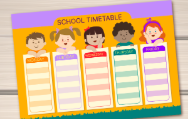Creating a daily schedule that nurtures learning is essential for young children. A well-structured routine offers predictability, supports emotional security, and creates numerous opportunities for growth in cognitive, social, and physical domains. When thoughtfully designed, daily schedules can foster curiosity, independence, and a love for learning.
The Importance of Consistency Children thrive in environments where they know what to expect. A consistent schedule helps them feel secure, reduces anxiety, and builds trust with educators and caregivers. Predictable routines also aid in transitioning between activities smoothly, minimizing behavioral challenges and increasing engagement.
Balancing Active and Quiet Times An effective learning schedule includes a balance of energetic play and restful moments. Active times, such as outdoor play or group movement activities, help children develop motor skills and release energy. Quiet periods, like storytime or individual exploration, allow for reflection and calm, enhancing attention and focus.
Incorporating Play-Based Learning Integrating play into the daily routine is key to early education. Structured and free play opportunities encourage creativity, problem-solving, and social interaction. Whether it’s through building blocks, imaginative role play, or artistic expression, play supports critical developmental milestones.
Flexible Structure for Individual Needs While consistency is important, flexibility ensures that the unique needs of each child are met. Some children may need more time to transition or additional support during certain parts of the day. Responsive scheduling allows educators to adjust routines while maintaining overall structure.
Embedding Learning Opportunities in Everyday Moments Learning doesn’t only happen during formal lessons. Snack time, clean-up routines, and even lining up can become rich educational moments. Educators can use these times to teach responsibility, language, counting, and cooperation.
Reviewing and Adapting Schedules Regular reflection on how the schedule is supporting learning is essential. Educators should observe children’s responses and adapt as needed to ensure the schedule remains developmentally appropriate and engaging.
Conclusion A thoughtfully developed daily schedule is more than a timeline; it’s a framework that supports all aspects of a child’s growth. By providing consistency, encouraging exploration, and allowing flexibility, educators create an environment where learning is both joyful and meaningful.


